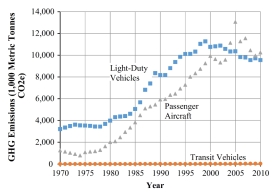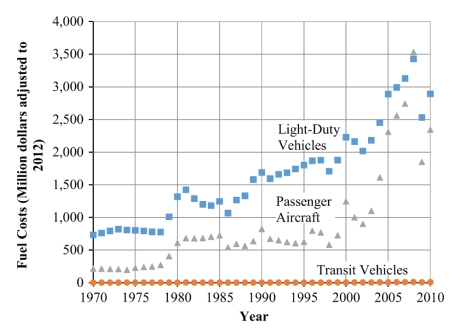
Between 1970 and 2010 the average weight across all overweight and obese American men and women increased approximately 5 kg and 6 kg, respectively, and that has added to the fuel needed to transport them, and greenhouse gas emissions in turn. Image copyright Neil Hester, used unaltered via Flickr Creative Commons license.
In case we needed any reasons other than health to watch our weight, a team at Carnegie Mellon University in Pittsburgh, Pennsylvania, has found some. Michelle Tom and her co-workers have looked at how our extra weight adds to the cost and carbon footprint of transport in the US. From 1970 to 2010, the extra fuel needed to carry overweight passengers’ ‘excess weight’ cost $103 billion in total. That in turn created extra greenhouse gas emissions over the 40-year period equivalent to half a billion tonnes of CO2. “Obesity is not just a public health issue, but also has implications for natural resource use and environmental degradation,” Michelle told me.
Weight is important in vehicle fuel use, with developing lighter cars playing a key role in recent efforts to make them more efficient. Working with PhD supervisor Chris Hendrickson, Michelle is studying the strain our heavier societies put on our resources, and therefore tackled the fuel burden from extra weight. “There have been headlines about the health issues associated with people being overweight and obese, but there has been very little analysis of what this means in terms of things like fuel use and calorie intake,” Chris noted.
Michelle pulled together data for personal vehicles, public transport and aircraft, including how many there are, how full they are, and how much fuel they’ve used. And thanks to efforts made to lighten vehicles, she also had access to good information on how weight affects fuel consumption. She could bring this together with records of the US population, how many of them drive, and how much they exceed the highest ‘normal’ body mass index. Combining all this with data on vehicle greenhouse gas emissions and fuel costs meant Michelle could calculate how heavy the impact of heavier people has been.
Hidden costs of food

Annual extra US greenhouse gas (GHG) emissions, measured in units equivalent to tonnes of CO2 (CO2e), due to excess passenger weight. Image copyright Elsevier, used with permission, see journal reference below
Trawling the data revealed some eye-popping statistics, which Michelle, Chris and their teammate Paul Fischbeck revealed in a Journal of Transport and Health paper published last week. For example: In 2010 the American population collectively carried 3.6 billion kilograms of excess weight, which is equivalent to the weight of 50 million additional healthy weight individuals. Between 1970 and 2010 the average overweight/obese American male and female gained approximately 5 kg and 6 kg, respectively (or about a stone, for UK readers). That means that although the number of people carried in personal vehicles has generally reduced or stayed the same, the ‘excess weight carried’ per vehicle has nearly doubled.
Although the impact on fuel use that translates to is thankfully more modest, it’s still important, especially given continuing increases in population and waist size. An overweight or obese person in the US in 2006 paid $40 extra for fuel, compared to $1524 extra health costs other researchers estimate obese people incurred that year. The extra fuel used over Chris, Michelle and Paul’s 40 year study period thanks to excess weight is equivalent to around one hundredth of the total amount consumed. Looking at 2010 alone, carrying extra weight added a similar amount to greenhouse gas emissions from transport. Emissions that year were the equivalent of 20 million tonnes of CO2 higher than if everyone’s weight was ‘normal’, making total US transport emissions 1.77 billion tonnes.
“If people simply look at our findings from a fuel use perspective, it will not figure very high on their priority lists,” Michelle admitted. “However, when taken into account with healthcare, work productivity, etc., our study further demonstrates the wide-ranging effects of obesity. These findings might be important to policy makers who are promoting public health because it shows that, in addition to improving personal well-being, a healthy lifestyle also contributes to sustainable living through reduced transportation energy use. Our study presents an alternative viewpoint of the impacts of being overweight and obese, which can inform officials and encourage them to develop policies that support healthy living.” Michelle is now studying how obesity is affecting farming’s greenhouse gas emissions, water and energy use – and Chris hints the impacts will be more significant than for transport fuels.

Annual extra US fuel costs from excess passenger weight. Light duty vehicles are typically personal transport, like cars. Image copyright Elsevier, used with permission, see journal reference below.
Journal reference:
Tom, M., Fischbeck, P., & Hendrickson, C. (2014). Excess passenger weight impacts on US transportation systems fuel use (1970–2010) Journal of Transport & Health DOI: 10.1016/j.jth.2014.05.001


June 14, 2014 at 2:04 pm
In Air Crash Investigation some years ago, there was a case of a plane that wasn’t carrying enough fuel for the weight of modern passengers. I have myself witnessed a man who was asked to move to a more central seat so that he would not upset the trim of the aircraft; and quite often people who have had to fit extensions to their seat belts.
June 15, 2014 at 12:25 pm
At what point should governments intervene to deal with the obesity problem and its knock-on effects?
June 17, 2014 at 2:57 pm
Thought this was interesting and would have validity, went to go read the actual publication in full and was severely disappointed… Other than a lack of modeling accuracy evaluation for various human health and transportation changes over the decades (eg driver demographic changes over the years due to licensing regulations), the inaccuracy of the data collection method (eg BMI is a very poor method for determining overweight status), self generating data to calculate weighted averages, the technological advancements of vehicular transportation (longer ranges, changed efficiency, etc), perhaps the biggest skewing factor that renders this study not very useful is the fact that population changes were not accounted for in the overall consumption of fuel. A simple look at figure 2 and figure 3 from the article (with their data taken from table 5) shows that consumption is overall consumption and not consumption per capita. This issue masks what actual overall consumption increases are from increased obesity – figure 3 (which is also above) shows decrease in Fuel Costs from 2007+ years (from the recession) – bleeding out the fact that fuel costs changes as a result of obesity cannot be extracted from the graph as the captions indicate. So overall, a very insubstantially conclusive study.